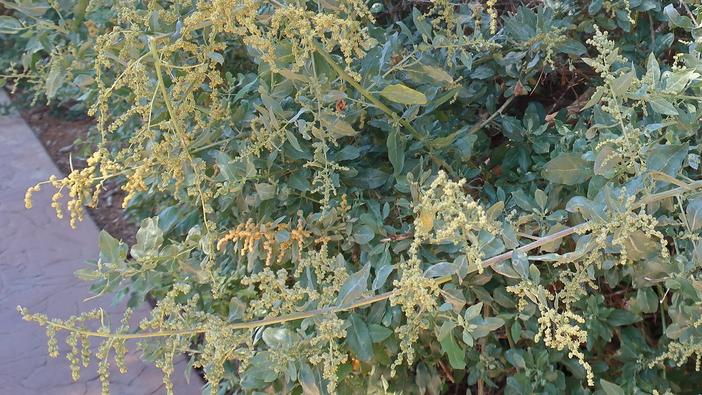Quailbush
(Atriplex lentiformis subsp. breweri)
Quailbush (Atriplex lentiformis subsp. breweri)
/
/

cultivar413
CC BY 2.0
Image By:
cultivar413
Recorded By:
Copyright:
CC BY 2.0
Copyright Notice:
Photo by: cultivar413 | License Type: CC BY 2.0 | License URL: https://creativecommons.org/licenses/by/2.0/ | Uploader: cultivar413 | Publisher: Flickr



Estimated Native Range
Summary
Atriplex lentiformis subsp. breweri, commonly known as Quailbush, is an evergreen shrub native to coastal sage scrub and saline environments in California and Baja California. It typically grows to a height and width of 3-6 feet (0.9-1.8 meters), with a rounded and spreading habit. Quailbush is characterized by its scaly, gray-green foliage and inconspicuous flowers that bloom in the summer. While the flowers are not showy, they are important for local wildlife. This plant is particularly noted for its ability to tolerate and thrive in saline and alkaline soils, making it valuable for habitat restoration and erosion control in challenging environments.
Quailbush is appreciated for its drought tolerance and its use in xeriscaping, where water conservation is a priority. It is also used for wildlife gardens, as it provides food and shelter for birds, including quail, hence the common name. In cultivation, Quailbush requires full sun exposure and can thrive in a range of soil types, provided they have good drainage. It is well-suited to coastal gardens due to its salt tolerance. Gardeners should be aware that Atriplex species can be dioecious, meaning individual plants may be male or female, and thus, a mix of plants may be necessary for fruit production.CC BY-SA 4.0
Quailbush is appreciated for its drought tolerance and its use in xeriscaping, where water conservation is a priority. It is also used for wildlife gardens, as it provides food and shelter for birds, including quail, hence the common name. In cultivation, Quailbush requires full sun exposure and can thrive in a range of soil types, provided they have good drainage. It is well-suited to coastal gardens due to its salt tolerance. Gardeners should be aware that Atriplex species can be dioecious, meaning individual plants may be male or female, and thus, a mix of plants may be necessary for fruit production.CC BY-SA 4.0
Plant Description
- Plant Type: Shrub
- Height: 3-6 feet
- Width: 3-6 feet
- Growth Rate: Moderate
- Flower Color: N/A
- Flowering Season: Spring, Summer, Fall
- Leaf Retention: Evergreen
Growth Requirements
- Sun: Full Sun
- Water: Low
- Drainage: Fast, Medium
Common Uses
Bank Stabilization, Fire Resistant, Low Maintenance
Natural Habitat
native to coastal sage scrub and saline environments in California and Baja California
Other Names
Common Names:
Scientific Names: Atriplex lentiformis subsp. breweri , Atriplex lentiformis var. breweri , Atriplex breweri , Atriplex orbicularis , Obione breweri , Obione orbicularis
GBIF Accepted Name: Atriplex lentiformis subsp. breweri (S.Watson) H.M.Hall & Clem.